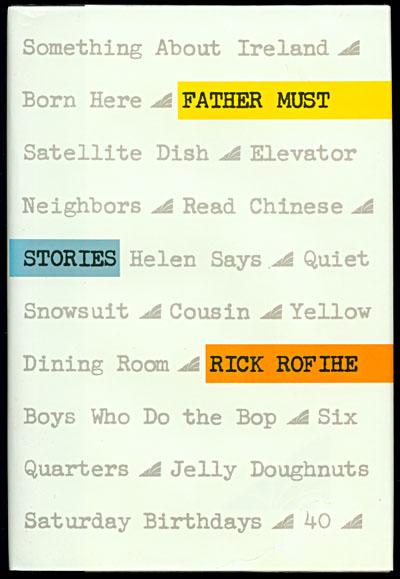-
The Ice at the Bottom of the WorldStoriesFrom"Strays"
We at school knew Mr. and Mrs. Cuts come from a family that eats children. There is a red metal tree with plastic-wrapped toys in the window and a long candy counter case to lure you in. Mr. and Mrs. Cuts have no children of their own. They ate them during a hard winter and salted the rest down for sandwiches the colored boy runs out to the pulpwood crew at noon. I count colored children going in to buy some candy to see how many make it back out, but generally our mother is ready to go home before I can tell. Our credit at Cuts is short.
 The Ice at the Bottom of the World : Stories
The Ice at the Bottom of the World : Stories -
The Ice at the Bottom of the WorldStoriesFrom"Genius"
Here is a list of things Carol has thrown at Genius: a sneaker with a toe full of sand in it, a coffee cup with a crescent of coffee in it, a raisin box with a half a box of raisins in it, and a picture of Genius holding a young girl under red and green plastic lanterns strung beside a pool. All of the things Carol has thrown at Genius have hit him in the face. The picture of Genius holding the young girl beside the pool Carol had to throw at Genius’ face over and over because Genius was asleep. While Genius was asleep was always when Carol looked through his stuff and read his mail. When she found the picture of Genius holding the young girl she had to throw it as hard as she could on Genius’ face over and over again until Genius finally woke up.
 The Ice at the Bottom of the World : Stories
The Ice at the Bottom of the World : Stories -
The Ice at the Bottom of the WorldStoriesFrom"Fishboy"
I began as a boy, as a human-being boy, a boy with a secret at sea and sentenced to cook in Big Miss Magine’s stone-scoured pot, my long fish body laid, tail flipping, into that solid stone pot, scales ripped and skin slipping from my meat tissue-threaded in the simmer, my body floating from my long, fish-bodied bones, my bones boiled through and through down to a hot bubbly sweet steaming broth, lisping whispers of steam twisting to the ceiling, curling in your curtains, speaking to you in your sleep.
 The Ice at the Bottom of the World : Stories
The Ice at the Bottom of the World : Stories
-
Rootie KazootieA Novel
“What do I want you to do? You really want to know? I’ll tell you. Just look me in the eye and tell me one thing. Just do it. Tell me whether you and Cynthia have made love. Tell me. Go on.”
“The answer is no.”
“You swear?”
“I swear.”
“I believe you,” she said quietly, and for a moment Richard thought it was over until she turned around and screamed at him, “THEN WHY DON’T YOU MAKE LOVE WITH ME?”
 Rootie Kazootie : A Novel
Rootie Kazootie : A Novel -
Rootie KazootieA Novel
He and Cynthia stumbled toward the other side of the room as the entire front end of the tractor broke through the splintered door and entered the house. As it did, the muffler, coming out above the hood, hit the top of the doorway and snapped off.
Oh, help, Caroline thought.
“HOLY SHIT,” Richard screamed.
“STOP HER,” Cynthia yelled at him.
It was an unsettling sight, to put it mildly, for Cynthia to see the front end of a 6,000-pound tractor rolling across her Oriental carpet, the very carpet she had chosen so that all the colors complemented each other and the old pine floor, the deep earth-brown and tan and the reds and yellows, and now, a green, wheezing and roaring monster with oil dripping sat on that rug.
 Rootie Kazootie : A Novel
Rootie Kazootie : A Novel -
Rootie KazootieA Novel
“It’s just that I hate being alone,” Caroline said. “I hate being poor, as well, and damn it all, here I go again back where I started. I hate going backwards. It takes so much out of you to get where you want to be. One person can’t do it nowadays, you know? It’s just too hard. You’ve got to have someone else. That’s what makes me so mad about that thing he’s run off with. She doesn’t need him any more than we need another hot day this summer. You know? She just doesn’t.”
 Rootie Kazootie : A Novel
Rootie Kazootie : A Novel
Selected Works
read more >-
Stories in Another LanguageFrom"The Slit"
I thought, I bet the daughter’s glad she’s dead, because what her mother was doing, throwing herself into the grave on top of the box like that, looked funny. It looked funny because her mother was fat, and it looked so much like the mother was doing the Fat Man Dance, because her arms were spread out too, as if she were waiting for her daughter to spread out her arms also, and then they could hold hands and smack bellies together and dance in circles on the box just the way we always did in the summer when we did the Fat Man Dance. Because we always did the Fat Man Dance in the summer when we ran around with no clothes on and danced a lot because it was summer.
 Stories in Another Language
Stories in Another Language -
Stories in Another LanguageFrom"The Headdress"
Before Touché put the sword down Karen’s throat, he told her not to move. He told her that it was something that people had to do together. He told her that both of them had to do it right or it would not work. Touché put Karen’s head back with his hand and then he put the sword down Karen’s throat. It looked to me like Karen was quiet, but I saw her eyes blink, maybe because the rain was falling into them.
 Stories in Another Language
Stories in Another Language -
Stories in Another LanguageFrom"Stories in Another Language"
On a hillside in China my father told me that he would teach me to fly by the time I was nine and that he would teach me to drive by the time I was twelve. I never understood why my father wanted me to fly first before I learned how to drive. I guess it was because he liked flying best.
I never learned how to fly.
 Stories in Another Language
Stories in Another Language
Selected Works
read more >-
ArabesquesA Novel
The intimate places of his father’s body were now within his reach, turned over to the touch of his fingers: his father who had never embraced him as a child. First he would touch his earlobes, to move them out of the way for the scissors, which had been taken out of the mother-of-pearl damascene box. Then he would take the nose between his thumb and forefinger, and give it a slight lift so as to shave above the upper lip. And the more the cancer gnawed away at the liver and the body grew limp, the more it opened to him, replete with its disappointments, sated with its tribulations. They would sit together in silence, the father and he, the youngest of his sons.
 Arabesques : A Novel
Arabesques : A Novel -
ArabesquesA Novel
As the Jews’ army was making its way along the road winding up to Deir El-Kasi, Abu Shacker was looting its houses. The inhabitants of Deir El-Kasi had not waited for the convoy to arrive. They were already across the border. And Abu Shacker, who had felt their outstretched arm upon his back in the days of the Arab Rebellion, now entered the home of Mahmood El-Ibraheem, who had been the regional commander in the days of the rebellion. The gate to the courtyard was open, as if the inhabitants of the house had just stepped out for a moment to visit a neighbor. Abu Shacker entered through the gate and shut it behind him as if he were trying to preserve, if only for a moment, the vanishing past, and he stood in the courtyard, in the very spot where he had stood ten years before.
 Arabesques : A Novel
Arabesques : A Novel -
ArabesquesA Novel
Imagine, then, a British soldier plummeting from the roof high above the third floor down into our courtyard, landing in a puddle of water from the early-December rain. The water splashes on the gas mask over the face of a boy playing by the puddle and blurs his vision. But first imagine a shot, just a single round from among the hundreds that had begun with the gray dawn, whose trajectory crisscrossed the skies of Haifa, in the warp and woof of the war between Jews and Arabs. Then imagine this one bullet hitting the soldier standing watch on the roof. He falls, and behind him the sharp spire of St. John’s Church rises toward the brightening sky. The boy, who is about seven, freezes to the spot where the thud has caught him trying to frighten a neighbor’s daughter with the gas mask he has bought from a peddler of military equipment. Now imagine the long second that passes between the thud and the scream: the silence that falls on the courtyard and is cast over the body, and then is lifted by the scream, which hangs in the air until the silence wraps itself again around the still body.
 Arabesques : A Novel
Arabesques : A Novel
Selected Works
read more >-
Father MustStoriesFrom"Satellite Dish"
I like a crusty bread. Last spring, when the man who sold my son the satellite dish told him that the signal wasn’t coming in good because of the big old elm tree across the road by the house, that it was getting in the way of the reception, everyone—my son, my daughter-in-law, my grandsons, and then, because everyone else was, even the man—looked at me. I loved that tree. It was always there. It would always make me feel good to walk in the yard through its patterned shadow on my way into the house. But then, across the road, there was the satellite dish. I said they could chop the tree down but I wanted every bit of wood from it cut and stacked in a pile by itself. And though I hadn’t done it for years, since we’d got an electric stove and a furnace, I started back using the old wood stove, which we’d left in the kitchen mostly for looks. It’s better to cook bread in a wood stove anyway. You can tell the difference not just in the crust but also in taste.
 Father Must : Stories
Father Must : Stories -
Father MustStoriesFrom"Read Chinese"
… sometimes in the coffee and pastry shops here in Chinatown I mimic the words I hear, but very softly. If you do it, don’t get too loud, because then it sounds like an echo, and people start looking around.
Chinese, spoken, is such a pleasing language. So many tones – it’s like singing. Since I don’t know what I’m saying, I never try to use those words when it comes my turn to order. I say, “One of those, one of those, one of those, one of those, and one of those. And one of those.” All in one tone. Not so pleasing.
 Father Must : Stories
Father Must : Stories -
Father MustStoriesFrom"Jelly Doughnuts"
Simmi’s only been in New York three weeks, but the second night she was here Buck took her to a coffee place he knew, and now Simmi makes sure he takes her there every night. Maybe if there’s somewhere else they have to be, something one of them has to do, they’ll skip a night, but they couldn’t miss too many, because then it would become something they used to do. And that would make it part of the past. And what she thinks is part of the past Simmi won’t consider.
 Father Must : Stories
Father Must : Stories
Selected Works
read more >-
The Floating WorldA Novel
My grandmother owned a valise in which she carried all her possessions, but the stories she told were also possessions. The stories were fantastic, yet I believed them. She said that when she was young fireflies had invaded her town, so the whole town was lighted even during the nighttime. She said she had been told that the summer she was born, strange clouds passed through the sky. Every night for seven nights, a different cloud. The clouds all had a strange glow, as if someone had taken the moon and stretched it into a cloud shape. Those seven moon-clouds, she said, had been a lucky omen. As she spoke, she always gestured a great deal, so the background to her stories would be the soft tinkling of the bell we had bought her.
 The Floating World : A Novel
The Floating World : A Novel -
The Floating WorldA Novel
I grew up with cards. Solitaire and gin were perfect for the monotony of driving. Despite my small hands, when I was six I could make cards disappear behind the ears of my parents, or make the ace of spades always materialize at the top of the deck. When my brothers were old enough to play, each of us owned several decks, not including those with missing cards. My family had Bicycle decks, decks with tigers on the back, decks with wildflowers, and one deck my father got in the army that had naked ladies. He was very embarrassed when I found that deck one day while cleaning. “I never bought anything else like that in my life,” he said, “but a man’s got to be a man.”
 The Floating World : A Novel
The Floating World : A Novel -
The Floating WorldA Novel
The night we packed, Tan came by after I’d gone to sleep. He called at my window, and we took a blanket into the trees. It would have been romantic, but a tick jumped into his ear and later we got rained out. Then, as I was climbing back through the window after saying good-bye for the last time, I slipped on the wet sill and fell into the mud with a wonderful suctiony sound. It was okay with me. The thing about our sex life was it made us feel close, not because it was romantic or beautiful or sweet or anything like that (although at times it was all of those), but mainly because it was a prodigious adventure we were going through together.
 The Floating World : A Novel
The Floating World : A Novel
Selected Works
read more >-
SquabbleAnd Other StoriesFrom"I And I"
You would like to go home. These drug runs are getting tiring. Besides, Mississippi makes you nervous. You look past your sun-darkened elbow out the window of the van at the house Rusty has sent you to. It is low, thick-looking, and made of red brick. Looks like a kiln. Stiff yuccas sprout from the bristling yard, and a dead palm tree bends against the right corner of the house. Timmy leans his sweaty face from the back, over your shoulder. “Rusty sure know how to pick ‘em, don’t he?” he says, breathing hotly on your ear.
Squabble : And Other Stories -
SquabbleAnd Other StoriesFrom"I Did That"
I began to confuse silence with invisibility. Not merely in the way schoolchildren sit mum in the back of a room, though my experiments with silence took that form. Sure enough, teachers did not call on me in class, kids did not speak to me or look at me during recess and lunch. I was convinced that I could disappear if I was silent. I would walk the most dangerous streets—skim them hushed. I discovered other invisibles, nearly invisibles really, since I could hear them. Others could not, I guessed because they were listening to something else, like their thoughts or their heart beating and so got mugged without ever knowing what hit them. But I could hear their shoelaces tap, the wind in their jackets, the in and out of their breathing. I moved among them, my shoelaces trimmed, my clothing fitted. Back then, I held my breath for hours.
Squabble : And Other Stories -
SquabbleAnd Other StoriesFrom"Pimp"
I got out. There was a line of tractor trailers parked about fifty yards from the building, and a couple were at the gas pumps farther to the right. I went into the diner to find out where we were. Just as I got inside, a man got up from a booth and blocked me.
“Hey, slut,” he said.
He cradled a tan cat in his left arm. He wore a sweatshirt with the sleeves cut out, and dirty army pants. He pointed to my crotch. “How’s that doing?”
Squabble : And Other Stories
Selected Works
read more >-
Total ImmersionStoriesFrom"Wish List"
As Frankel muses on Progress in his Hillman Minx, Ed Markowitz wearily drives a rented Fiat to the Oriental Institute. He had not wanted to go on the day of his arrival, but this is the only time he can be sure to see Mujahid Rashaf, who is returning to Saudi Arabia within the week. Rashaf is an Oxford fellow and the son of a merchant prince. He will provide just the reasoned yet religious opinions that Markowitz seeks for his book, Terrorism: A Civilized Creed.
 Total Immersion : Stories
Total Immersion : Stories -
Total ImmersionStoriesFrom"And Also Much Cattle"
The baby rabbis are nineteen. They aren’t quite rabbis yet, but they will be next year. They’ve finished their schooling and begun traveling with white shirts from home and food in plastic bags. They carry candlesticks, tefillin, tanachs, and press releases. They plan to get in touch with Jewish college students at the University of Hawaii, the local newspapers and radio. But tonight they look small and young as they sit together on the piano bench, backs to the keyboard, covered for the holiday.
 Total Immersion : Stories
Total Immersion : Stories -
Total ImmersionStoriesFrom"Clare"
Clare never bathes. She is wanted by the police for writing poetry. Why should she wait for them like Marat, alone and naked in the bathtub? Her life is doubly dangerous because she translates. She is wanted by the police in Germany and the nuns in Spain—they kept her in wards with crucifixes over the beds, locked doors. They want her words; they pick at her brain. They would lock her in her room like a prisoner in a tower, spinning their straw into English. Clare never works in her room. She has to keep moving.
 Total Immersion : Stories
Total Immersion : Stories
Selected Works
read more >-
The Late Summer Passion of A Woman of MindA Novel
It was true that Eva’s male colleagues had by now ceased to joke among themselves that a hopeless crush on Professor Mueller ought to be included among the requirements for the major in philosophy, but this was not because the students no longer fell in love with her. They did, at a rate which had of course slackened over the years but was still not inconsiderable. It was an irony—of course quite lost on Eva, who was steadfastly oblivious to the dramas in which she figured—that many who sat raptly listening to their professor’s lectures on the “futility of the passions,” on the need to transform the passive emotions directed towards objects and people outside ourselves into the active emotions of the intellect, were swollen with an advanced case of that same passive desire whose elimination was being eloquently, even passionately, urged upon them.
 The Late Summer Passion of A Woman of Mind : A Novel
The Late Summer Passion of A Woman of Mind : A Novel -
The Late Summer Passion of A Woman of MindA Novel
The hands of the women lingered over their tumescent bellies. A girl no more than fifteen sat beside Eva. She was obviously in an advanced state. Her skinny, childish legs in cheap sky-blue summer pants dangled down from her engorged womb. Eva stared in disbelief at the bulge of it. The thing quivered, and the girl giggled at Eva, making a motion of swimming. Eva fought down the surge of acrid sickness, averting her eyes from the sight.
She sat all afternoon, as women came and went. There was no receptionist; patients were called in by the doctor himself.
 The Late Summer Passion of A Woman of Mind : A Novel
The Late Summer Passion of A Woman of Mind : A Novel -
The Late Summer Passion of A Woman of MindA Novel
It was in this first book that Eva came upon a reference to Joseph Goebbels’ children. Gisevius made a passing, cynical reference to the presence of the Goebbels children at one of those fêtes the Nazis were such masters at creating, Hitler’s fiftieth birthday party perhaps. “There were the inevitable Goebbels children, trotted out once more for display.” Yes, she could remember them. There had been six of them. They had been pointed out to her once, at some sort of celebration, very very large. Perhaps it had even been that massive birthday party for Hitler! They had been standing on the podium, beside their mama and papa, dressed all in white. She could not really remember how their famous papa had looked. She had only stared at the beautiful children, the six shining specimens of Aryan perfection.
“Look,” Mama had said, “look at how beautiful and good they are.”
 The Late Summer Passion of A Woman of Mind : A Novel
The Late Summer Passion of A Woman of Mind : A Novel
Selected Works
read more >Stanley Crouch
-
Notes of a Hanging JudgeEssays and Reviews, 1979-1989From"The Electric Guardian Angel"
Breaker, trick rider, picador, and the heavyweight ring’s fastest jockey, Ali has made ring time canter and canter, bow, leap over giant bushes, and move so much in his own terms that time became mutual with his grace, Truly the Professor of Boxing, he elasticized his profession, made daring and cunning and mystery part of the craft. Did we ever wonder as much during anybody else’s fights what the champ was thinking?
 Notes of a Hanging Judge : Essays and Reviews, 1979-1989
Notes of a Hanging Judge : Essays and Reviews, 1979-1989 -
Notes of a Hanging JudgeEssays and Reviews, 1979-1989From"Animated Coon Show"
As with any ethnic group, there has always been an element of self-satire in most black American humor, a touch of the minstrel. But the irony of the grotesque reduction to sambo stereotype by white performers in blackface is that its popularity owed as much to the vitality it distorted as it did to the appeal of racism. Consequently, when cartoon characters are based on actual black entertainers like Fats Waller, the question becomes what it has been since Pigmeat Markham, Moms Mabley, Flip Wilson, or, for that matter, The Jeffersons. Where does the stereotype stop and the fun begin? Where do we draw the line between vernacular humor and cinematic slander? During the years when these cartoons were made, the shuffling, giggling, lazy, and stupid darkie was supposed to have represented black authenticity to white Americans. Maybe yes, maybe no. What, for instance, did white Americans think when they watched newsreels showing handsome Joe Louis whipping white men with very consistent regularity on programs that also featured Negroes running from sheets in films or personifying incompetence and abandon in cartoons? Perhaps it was simply more convenient to accept the stereotypes.
 Notes of a Hanging Judge : Essays and Reviews, 1979-1989
Notes of a Hanging Judge : Essays and Reviews, 1979-1989 -
Notes of a Hanging JudgeEssays and Reviews, 1979-1989From"Man in the Mirror"
The American dream is actually the idea that an identity can be improvised and can function socially if it doesn’t intrude upon the freedom of anyone else. With that freedom comes eccentric behavior as well as the upward mobility resulting from talent, discipline, and good fortune—and the downward mobility observed in some of those who inhabit the skid rows of this country because they prefer the world of poverty and alcoholism to the middle-, upper-middle-, or upper-class backgrounds they grew up in. As one bum who had obviously seen better days said to a waiter as he was being ushered out of the now defunct Tin Palace for panhandling, “People come from all over the world to be bums on the Bowery. Why should I deny myself that right?”
 Notes of a Hanging Judge : Essays and Reviews, 1979-1989
Notes of a Hanging Judge : Essays and Reviews, 1979-1989